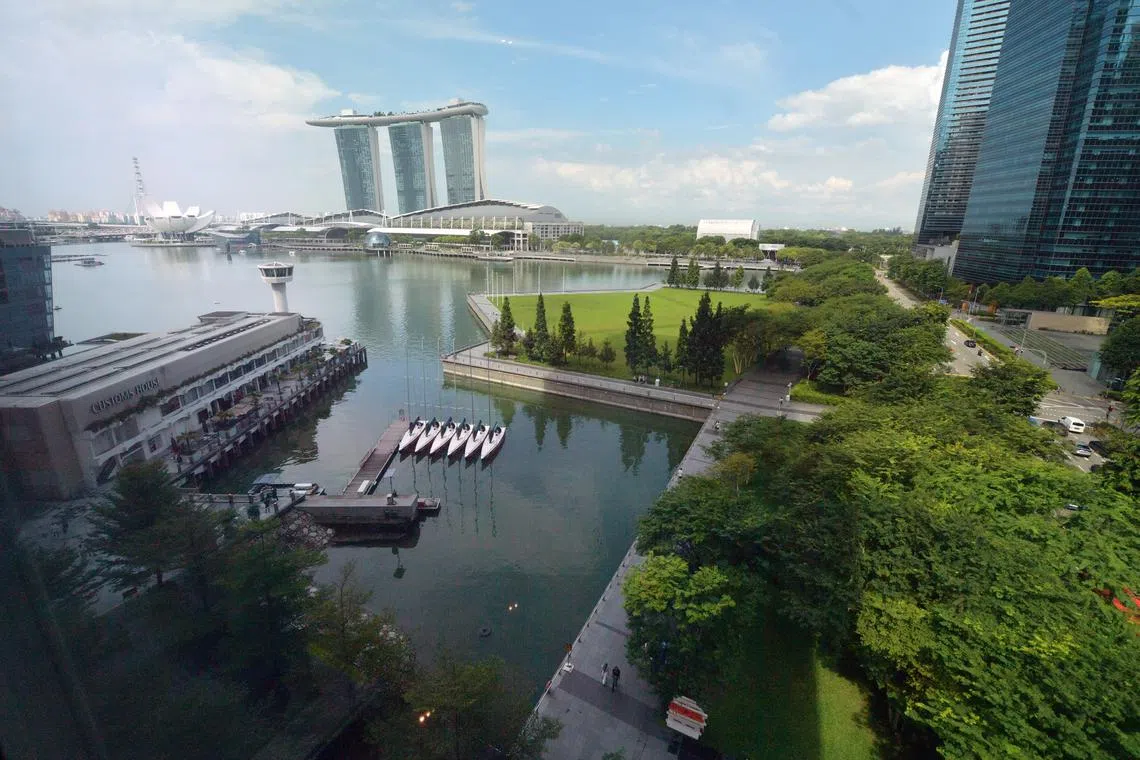Jobs in green economy in hot demand as S’pore looks to become carbon services hub
Sign up now: Get ST's newsletters delivered to your inbox

Jobs in the green economy to help businesses decarbonise will be easier to fill with a new points-based Employment Pass framework in September.
ST PHOTO: ALPHONSUS CHERN
SINGAPORE – As Singapore looks to establish itself as a carbon services and trading hub, jobs in the green economy to help businesses decarbonise and implement their net-zero strategies are now in hot demand.
Firms looking to hire foreigners for certain roles in this sector will find it easier to do so with a new points-based Employment Pass framework that will be launched on Sept 1.
Four roles – namely carbon verification and audit specialist, carbon trader, carbon programme manager and carbon standards and methodology analyst – will draw extra points on top of criteria such as educational qualification and salary.
They are among a list of 27 occupations given bonus points where Singapore has a talent shortage, in sectors ranging from alternative proteins to technology and healthcare.
A check by The Straits Times found at least 12 related job titles on platforms such as MyCareersFuture and LinkedIn, many of them in carbon auditing. The jobs were posted by companies such as environmental auditor TUV SUD, oil giant BP and various recruitment agencies.
Mr Sharad Somani, partner and head of KPMG’s environmental, social and governance (ESG) arm, said the four roles involve helping companies map and implement net-zero strategies.
For instance, a carbon standards and methodology analyst can establish science-based targets for companies to reduce their carbon footprint, while a carbon project manager can help implement the plan to achieve the goals.
A carbon trader can help companies offset their carbon emissions using carbon credits, and a carbon verification and audit specialist will be able to measure how well a company is doing in reducing emissions, he added.
These roles are critical if Singapore is to become a carbon services hub, he said, noting that KPMG estimates the decarbonisation sector to be a US$10 trillion (S$13.3 trillion) market opportunity in South-east Asia, with the potential to create more than 5.5 million new jobs by 2050.
Through the Singapore Green Plan
Singapore will need to train local resources as well as attract talent from overseas to sharpen its edge over other countries vying for market share of the green economy, he added.
Ms Jaya Dass, managing director of Asia-Pacific permanent recruitment at Randstad, said that as the sector is new, many potential job applicants may not be aware these green jobs exist, or that they are even eligible, although they have transferable skills and exposure from past work projects.
“For example, procurement professionals who have been trained to shortlist vendors that have met sustainability standards can consider furthering their career with a company that is investing and driving its sustainability agenda forward,” she added.
More demand for talent in carbon markets
Mr Somani said that global carbon marketplaces AirCarbon Exchange and Climate Impact X, which are based here, are set to grow rapidly, and will need carbon trading professionals.
He expects professionals working in commodity financing and trading, insurance and legal services to move into the carbon management and trading sector.
Ms Lorna Ritchie, practice director for climate and sustainability at strategic advisory firm Global Counsel, said that carbon markets are still relatively new and are only starting to gather momentum.
This means that while there is a shortage of experience globally, having a hub approach can help the Republic draw talent here, as professionals – including those overseas – will want to be where the action is.
Mr Gabriel Nam, partner at recruitment agency Page Executive Singapore, said the talent pool for carbon market-related roles is usually international, especially for more senior positions.
“For example, we recently successfully recruited a carbon market advisory talent from Japan to work in a leadership role based in Singapore. With the new Employment Pass laws, the recruitment process is expected to become more straightforward and the talent pool is expected to expand, allowing for more cross-border hiring for even junior-level positions,” he said.
Asked about AirCarbon Exchange’s strategy to attract talent, Ms Hum Wei Mei, who is its head of Asia-Pacific and global head of carbon and environmental products, said the company usually hires staff based on their professional qualifications and transferable skill sets for its non-software engineering roles. Training is provided in-house.
Climate Impact X launched an executive programme on carbon trading with the National University of Singapore’s (NUS) Business School and the NUS Centre for Nature-based Climate Solutions in 2022 to guide companies on their carbon management strategies.
Professor Lawrence Loh, director of NUS Business School’s Centre for Governance and Sustainability, said that the course is “very well subscribed”, and is already in its third run within less than a year.
He added that while foundational knowledge for carbon management can be found in existing university courses, skills in more relevant areas like carbon measurement and trading can be acquired through continuous learning programmes.



